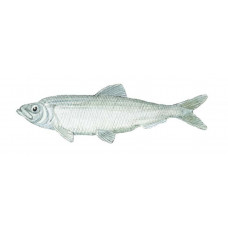Latin Name
Clupea harengus harengus (Linnaeus, 1758).
Titles in different languages
Herring, Atlantic herring (eng), Hering (deu), Aringa (it), Мурманская, норвежская, океаническая сельдь (ru).
Features
The body is low, the head is small, the lower jaw is protruding forward, the teeth are well developed. The body is covered with cycloidal scales, the head is naked. D - 17-21 (the first 3-4 rays are unknown), A - 16-20 (the first three rays are unknown), P - 15-19, V - 7-10, vertebrae 56-59. The back is dark, green or blue, the sides are lighter, the belly is white or silver white.
Spread
Widespread distribution in the North Atlantic Ocean. The range is limited to the area of Atlantic waters and associated with the warm branches of the Gulf Stream.
Characteristic
It is a gregarious plankton-eating fish of no more than 36-42 centimeters in size. It feeds at the sea surface, hibernates and spawns in the benthic layers. Usually lives in waters with positive temperature and high salinity. A distinction is made between spring, summer, autumn and winter, herring according to the spawning time. Spring and fall spawning herring are most abundant.
Reproduction
Spawning is simultaneous. Spring spawning herring spawn in March-April off the coast of Norway, off the Faroe Archipelago and along the southern coast of Iceland. Spawning occurs at depths of no more than 200 meters at water temperatures of 5 to 7 degrees Celsius and salinity of at least 34 ppm. Summer and fall spawning herring spawn in June-August off the coast of Iceland. Spawning grounds are located in fjords, bays, on the shoals of the open sea, near the coast. Fertility averages 80 thousand eggs. Females spawn repeatedly.
Development
The eggs are bottom-dwelling, deposited on rocky ground, sandy bottom, shells, and pebbles. Development of eggs occurs under stable temperature, high salinity, low light, and high pressure. Larvae hatch after 12-20 days. Larvae are 6-8 millimeters long. Larvae enter external feeding after 8-10 days.
Growth
The growth rate is determined by the intensity of fattening in the respective area. Sexual maturity occurs at the age of 5-6 years. They live up to 20-25 years old. In commercial catches of fish no older than 12-15 years.
Food
The main food of herring is calanoids, euphausiids, and amphipods. There are larvae and fry in the stomachs of fish, including their own species. In mid-July, the fat content of herring reaches 16-18%, and in August - 20-22%.
Migration
All herring breeding areas are strongly influenced by Atlantic currents. In the middle of January, clusters of wintering herring begin to migrate and in February come out to spawning grounds. They stay in the breeding area until the end of March - middle of April. In July-August, they occupy vast feeding waters. In August and September, they migrate back for wintering.
Fishing
Most of the fishing is done by Norway, Russia and Iceland. Norway and Iceland fish for herring with purse seines.
Interesting Facts
When Atlantic herring expel gas, the resulting bubbles create a high-frequency sound that only other herring can hear. The fish use this noise to form "protective shoals" at night, which makes them feel safe.
Atlantic herring
Tags: Atlantic herring




